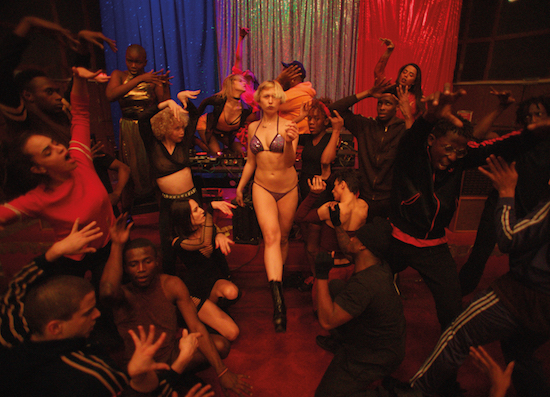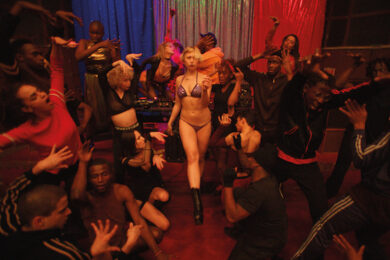DANCERS. A PARTY. VINYL. SANGRIA. GIRLS. A CHILD. A FLAG.
Sometimes it’s the most incongruous thing that proves the most important. These are the words, in glittery block capitals, that flash up as intertitles against a black screen, punctuating the clips in the official trailer to the new film by Gaspar Noé, Climax. But what is going on here? Yes. Climax is a film about dancers. The dancers are having a party. A DJ is spinning records. The music, in fact, is almost non-stop, relentless. There is sangria – and this sangria will prove as crucial to the development of the plot as the dancers and the party itself. Ok, there are girls, sure (there are boys too, but, ok, whatever). And there is a child.
And perhaps you can already see where this is heading. Wild party, loud music, too much sangria, uh oh – someone brought their child. Something could go wrong there.
In fact, more or less everything goes wrong.
But we’ll get to that.
First off: that seventh element. What’s that about?
A flag. What does this film have to do with a flag?
Yes, ok. The flag is there. It’s almost omnipresent, the literal backdrop to the film – a big bleu-blanc-rouge French flag in the same shimmer, glittery colours that decorate the letters of the intertitles in the trailer. It is garish and glitzy and kinda showbiz looking and all the things that we precisely do not usually associate with the French flag. But what is it doing there?
As those trailer intertitles suggest, almost all of Climax takes places within the confines of a single party, on a single night, in a single building. Most of it in one room. The main hall where the DJ spins his vinyl discs and the dancers dance and the sangria bowl sits. And at the back of that room there is this big glitzy tricolore covering the wall. It is in fact the first thing we see when we enter this space. The camera pans down the flag like a woman’s leg in an old film noir and a line of text on the screen says, “A French film and proud of it.”
This would be a pretty strange thing to slap on the beginning of any film. But Climax is perhaps especially far from our typical image of what a French film is. This is no Desplechin picture about a bourgeois family having dinner parties and affairs.
Arguably, Gaspar Noé has already done more than most to redefine exactly what we might mean by and what we might expect from a “French film”. Since his first features around the turn of the millennium, when he was lumped in with what Artforum’s James Quandt called the “New French Extremism”, alongside Catherine Breillat, Bruno Dumont, Bertrand Bonello, and Marina De Van, Noé has consistently fucked with the form, turning cinematic time and space on their head, reaching for the edges of acceptable subject matter, looking for the limits of the visible. His films have consistently sought to bypass rational responses and lurch straight for the most visceral sensations of the reptilian brain. As a result, few people really think about Noé’s films, what they are saying and what they are doing – an attitude that seems to be reinforced by Noé himself in the interviews he gives. But then there’s that flag and that “French film” declaration.
As ever with Noé, it’s hard to know how serious to take such proclamations. The intertitles in Climax – san serifed cod-philosophical pronouncements that “LIFE IS A COLLECTIVE IMPOSSIBILITY” and so forth – seem at times to be almost specifically designed to make audiences doubt the author’s sincerity.
But what happens if we take this “French film” assertion seriously. If we grant that Climax is intended to be a “French film” in a sense more profound than the sense meant by IMDB, say, that is, that the major source of funding, most of the crew, most of the cast, and so on, came “from” France. What if this is a film “about” France? And about “Frenchness”?
Of all the arts, dance is probably the clearest symbolic expression of relationships between an individual and a couple and a larger group, or between an individual, a family unit and a society. Climax lays this out almost schematically. We first see all the characters individually, talking face to camera, one by one. Then (after the big group dance) we see them talking in pairs (mostly about coupling, of one sort or another). Only then do we start to see them interact as a group.
Power dynamics, relations of dominance and subordination become clear very quickly. And then a crisis strikes and everyone freaks out. Naturally, the first thing they do is forcibly eject the only Muslim member of the group.
But how does that square with “…and proud of it” ?
Perhaps in the end Climax is not about – or at least, not just about – a society faced with a crisis (the film is set in 1996, shortly after the hijacking of Air France Flight 8969, the nail bomb attack at the Gare de Saint-Michel-Notre-Dame rail station, the same year 85 people were wounded by an explosion at Port Royal RER station…) and responding with total breakdown, victim-blaming, mass recrimination and focusless reprisals. It could also be a film about who gets to represent France and Frenchness. Not, for once, the white bourgeois family of your typical Desplechin film, but a vibrant group of young people, kids from the clubs, from the suburbs, multi-ethnic, polyamorous, queer, trans, internationalist.
And while it’s upsetting expectations concerning what we mean by a “French film”, Climax also succeeds in making us question what we expect from a “film” per se.
This has been Noé’s most critically acclaimed film for some time, but it’s also, in many ways, one of his weirdest. Probably, of all his films, the least comparable to any other movie. It feels less like Irreversible or I Stand Alone, more like the vodú ritual we glimpse in Noé’s contribution to 7 Days in Havana or the pop videos he’s made for SebastiAn and Thomas Bangalter. We recognise less the influence of Kubrick, as in Enter the Void; more of artist film-makers like Ryan Trecartin or Carolee Schneemann. Even within Noé’s wild and outrageous oeuvre, Climax feels like a bold step towards a freer, more unpredictable kind of film-making. I can’t wait to see where he goes next.
Climax is at UK cinemas now



